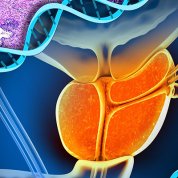
On the Cover
NHGRI researchers have identified a specific genomic signature of some aggressive prostate tumors. The finding focuses on BRCA2 mutations, which are associated with breast and ovarian cancer, but also increase men’s risk for prostate cancer. Both men and women can inherit a faulty BRCA2 gene. When working properly, the BRCA2 gene helps stop cells from becoming cancerous by producing proteins that fix damage to DNA.
ERNESTO DEL AGUILA III/NHGRI





